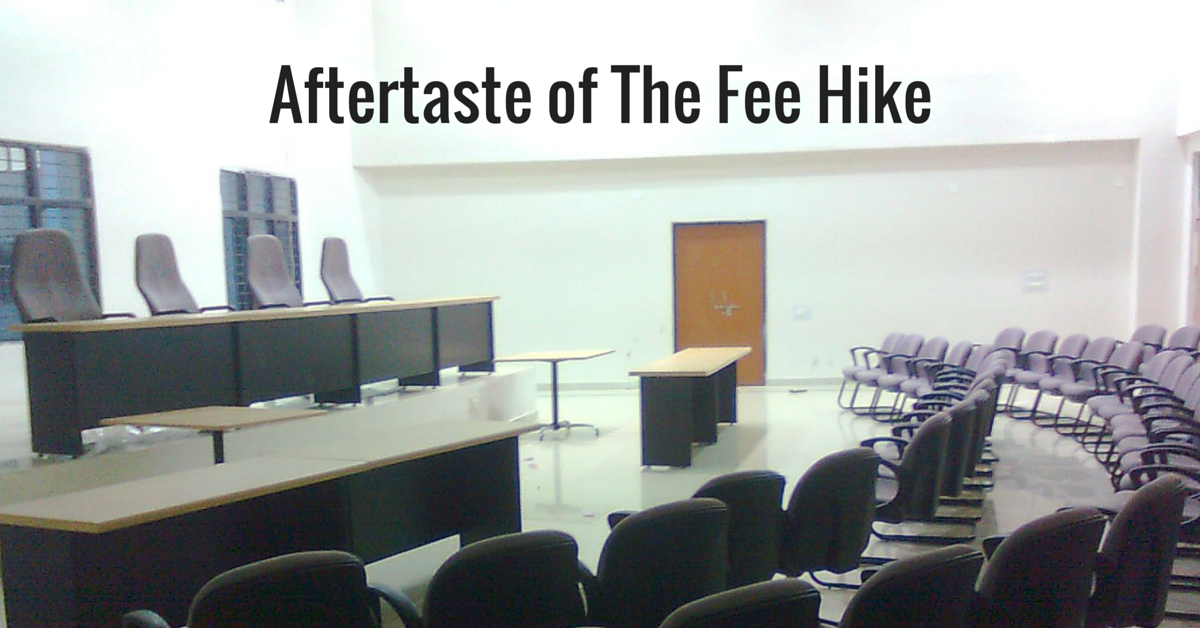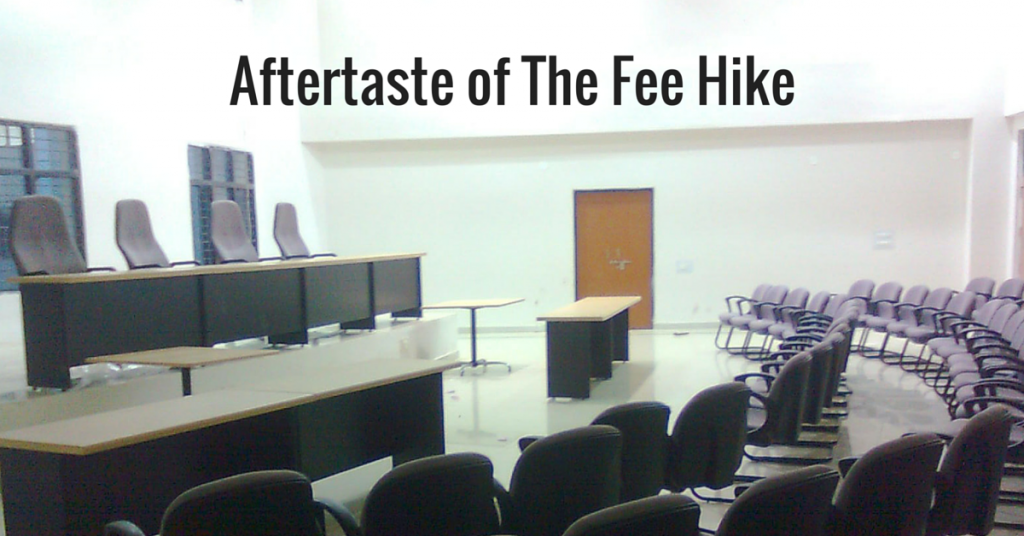This was the first ever blogpost I ever wrote. I launched a blog called A First Taste of Law when I was studying in my 2nd year in law school, in 2008 with this post that I was compelled to write when faced with a fee hike that threatened to cut my career as a law student short. The fee hike took place, and I managed to pay the increased fees as I started to work on the side. Interestingly, working part time was prohibited by the rules of the University. Anyway, as we have shut down A First Taste of Law, I am republishing this article on this blog. Read on to know how a 2nd year law student studying on student loan feels when there is a huge fee hike.
I have been planning to create this blog for some time; the events that precipitated me to do so also determined the subject of my first post.
The news about the fee hike at National University of Juridical Sciences (NUJS)for the incoming batches as well as existing ones is not really new, and the students know about this for weeks now since they started receiving an ominous letter from the University summarily informing them that their annual fee has been hiked (by 50% of what it used to be) and depending on whether they have taken admission through general seats or NRI sponsored seats, they will now pay a fee increased by Rs. 45,000 (for general seats) or $1500 (for NRI sponsored seats) every year. While the existing students were shocked to know the quantum of the hike, most of them did not notice that the hike for the incoming batches was far more severe. For them, the fee was increased by 100%. NUJS as of now is charging the highest fee among all the law schools – three times the fee that is charged by, for example, RMLNLU, Lucknow, another law school with state-of-the-art infrastructure (Surprisingly, it was the law school that charged the least when I joined NUJS back in 2006). Though the news is not new, but all its consequences are becoming clearer as days go by.
Recently there has been some much needed and awaited improvement of infrastructure in NUJS. There has been tremendous improvement in the quality of faculty as well (currently there are 4 oxford alumni in the faculty, apart from a fairly large number of ex-law schoolites and those who have been to either a red brick or ivy league university). It understandable that the expenditures of the University has increased, especially in view of the sixth pay commission. The University has not offered any reason for the hike to the students, but from interaction with members of the faculty and others, the reasoning seems to be simplistic. The expenses have increased, so the fees must go up. Even the IITs and IIMs have been raising fees, why should the law schools not do the same?
There is no doubt that expenses are increasing and fees paid by the students is the source of income for a law school like NUJS which takes pride in its financial independence. However, anyone familiar with the law school scenario will be able to tell you that some very important things have been overlooked.
The ability to pay varies widely among the students. The fee was already high right from the inception of law schools, but the Rs. 70,000 per annum or so fee (which unlike the IIMs, have to be paid for 5 years) was not found to be something unmanageable even by those who did not have the money, as banks were forthcoming with educational loans as even the banks were aware of the 100% recruitment rate in NUJS. The world of banking has changed much since the subprime crisis and slow down. Banks, including PSU banks, are not even willing to extend an existing loan by the extra Rs. 90,000 that I need to complete my legal education. If at all they would consider it, they want a collateral security (naturally, as they know that in face of the economic slowdown the job market, including that part of it where young law school graduates seek to be employed, has been more than suffering).
The loan officer from SBI also reminded me that I must take Life Insurance coverage for the whole amount I shall take as a loan, and only 75% of the entire amount to be paid to the University can be financed according to their rules. The interest rate, of course, has to be floating (it is subject to change, and will always be above the standard rate of interest). I fail to satisfy the first condition of providing collateral itself, so an extension of the loan was ruled out.
And all these despite the fact that I pay monthly interest on the borrowed amount instead of letting it accumulate. Even before paying any part of the hiked fee, my parents already pay above Rs. 3,000 in interest and the necessary life insurance cover I had to take to get the loan. Anyway, I have been able to find alternative sources, at least for the time being, to finance my education (I am doing some part time work and my parents are breaking some of their savings to sail me through the last two years in law school education). I have been fortunate that both my parents have stable government jobs. I wonder what I would have done if one of them was in one of the many industries stricken by the recession, layoffs and salary cuts. For several reasons, as I learnt over the course of the last two months, and that not only of my own, I have come to believe that the nature, quantum, and timing of the hike has been unjust and inappropriate. The management has failed to take in consideration many issues that should have been their priority as custodians of the Institution.
Firstly, a law school is an inherently American concept. The Indian law schools were modeled after the law schools in the USA. Those law schools are not totally dependent on fees earned, and from infrastructure development to different chairs, much is financed by private endowments. Law schools there are free from the control of the government, and they are autonomous. Indian law schools want to have the same autonomy, but they have done precisely little to mobilize any sort of funds. At least NUJS does not have any private or government endowment to speak of, barring a couple of chairs endowments. In the past, the management has even turned away corporate donors. However, they expect to finance a world-class library, computer laboratory, wi-fi and a master roll of who’s who of Indian legal education for faculty out of the fees paid by the students. What is the result?
The fee levied on students is something that is out of reach of even the middle-class student, forget the poor ones. Law school is a dream for many who want to use education as a tool to do well in life, but it seems if you are not well-to-do and afford to pay 1.8 lakh per annum for 5 years, NUJS is no place for you. It is true that there are many many students ready to pay this fee for a seat in NUJS, and many of hem can afford even more, but this also puts many students out of the fray. NUJS is choosing who can study in the University, and I do not think this choice entirely belonged to them. If the economically weak is to be effectively excluded from the best legal education in the country, there ought to be a more public debate and a policy decision at a higher level.
Secondly, I heard that there has been a proposal that to enable poor students to study in NUJS, there will be 10 scholarships given per batch, though no criteria so far has been announced for that. I assume some of the scholarships will be reserved on basis of caste. the other criteria Will me means-come-merit as usual. Thereby, the number of poor students who can study in NUJS will now be effectively restricted to 10 seats per batch. Till now, almost anyone could finance a law school education by supporting it with a bank loan. Again, this was not a call NUJS management was entitled to take on its own. Interestingly, The VC has apparently told the student representatives that it will never happen that a student will fail to study at NUJS because of financial reasons. I hope he would explain his position more publicly.
Thirdly, given that till late neither faculty or infrastructure was anything remarkable compared to other law schools,NUJS always have done wonderfully compared to those which had better faculty and better infrastructure. It has always trumped other law schools with its students. Students broughtNUJS fame and recognition. Even now law firms visit NUJS in campussing season in hordes because of the quality and effort of the students. Now the fee hike move is going to compromise this strength NUJS always had. A number of students who cracked CLAT this year told me that they are wishing that they had put NUJS further down the preference list, and then they could have gone to another law school with little difference and pay half or one third the fee. Given that students get admission throughCLAT these days, the extra fee is going to make a difference as meritorious but financially weak students are likely to rule outNUJS (even assuming they had a choice).Fourthly, even if increasing fee was an inevitability, the timing of the decision is appalling. This is the first time in history of
NUJS the recruitment was not very good. it has been far worse than any recruitment ever (as it has been everywhere else), average salary has dropped by an approximate 50 -70% (still much better than most other law schools, with the possible exception of NLS, Bangalore. Law schools this time has not very forthcoming with their recruitment data), and I would not write any more details of it here, but the facts are very well known to the management. I also presume they know that all the banks have tightened their strings since the subprime crash, and they are fairly aware of the situation with the job market. They are more reluctant than ever to give hefty educational loans. Last time I heard, the University had a buffer of 14 crore stacked up in government bonds. Is this not the time to use such buffer rather than making the futures of law students uncertain (which is already uncertain given that foreign law firms has reduced their absorption rates from training contracts, and law firms in India are hardly expanding anymore; and starting salaries are all time low)?
Further, though the University treats the students as its only source of funding, it is not ready to discuss the hike with them. It did not find it necessary to explain to them why a fee hike was necessary or justified. No suggestion was asked from them about alternatives. The university seems to treat the students like a stretchable money bag, unworthy of consulting. Students and alumni are very important stakeholders of
NUJS, I wish the management understood that and could use that fact to the benefit of the university.
Lastly, NUJS is not facing a problem that no other law school faces. All other law schools are financially independent as well.NLS, Bangalore also increased its fee this year, but the new fee is applicable only to the new batches that will enter. Also, the quantum of hike is far more moderate.NUJS has a duty to explain this unprecedented hike.The worst off in this dilemma were who applied through the NRI quota to NUJS.
At the time they applied, the fee to be paid in 5 year was something around 9lakhs. After they had submitted their form to the CLAT office, they were notified that fee has been increased to 18 lakhs. Many of students who applied through NRI quota in the hope of getting through NUJS could afford 9 lakhs, sometimes with aid of an educational loan, but 18 lakh is an entirely different story. The worst thing is, due to a strange ‘preference system’ that law schools follow, if one gets NUJS through NRI quota (for which one have to get an NRI to officially agree to bear the fees; in reality though, the parents bear it), they can not go for another law school even if normally their rank would allow them to do so. What happens to those students who could afford 9lakhs, but can not afford 18lakhs? if they get through NUJS, they would not be able to study in any law school though their rank would have allowed them otherwise. The reason for this eludes me.I hope the management has very good reasons to increase the fee in such a manner, and would offer that explanation to the students and their anxious parents. They should engage in a public debate before giving effect to this decision.
 Serato DJ Crack 2025Serato DJ PRO Crack
Serato DJ Crack 2025Serato DJ PRO Crack











 Allow notifications
Allow notifications


